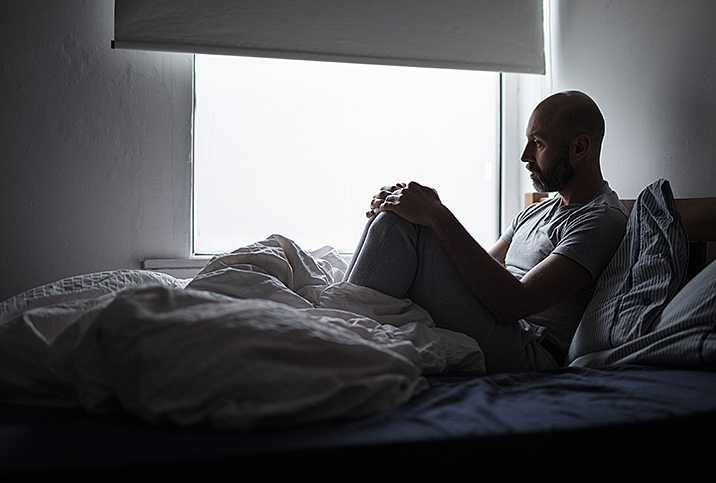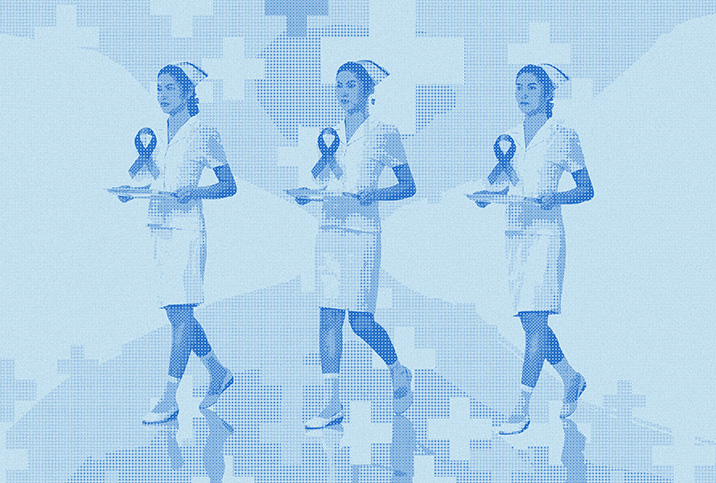Prostate Cancer Treatment Is Bolstered by Integrated Mental Healthcare

The preliminary analysis of a recent study published in the Journal of Urology found more than one-third of men with newly diagnosed prostate cancer experienced at least one mental health issue. The researchers highlighted that routine screening for mental health should be considered to improve the quality of life in patients with prostate cancer.
With this in mind, is mental healthcare a routine part of prostate cancer treatment?
Assessing a patient's mental health is an extremely important part of delivering care throughout a patient's cancer experience—from diagnosis through treatment and into survivorship—according to Karen Autio, M.D., a medical oncologist who specializes in prostate cancer at Memorial Sloan Kettering Cancer Center in New York City.
"If any care team member identifies a patient with a mental health need, we offer emotional support, referrals to social work, the counseling center, and psychiatry services and support groups," Autio said. "It's important to validate an individual's feelings and try to remove the unfortunate societal stigmas about mental health."
Doctors asking about mental health
Asking about a cancer patient's mental health is common today, and this practice applies to men with prostate cancer, explained Andrew J. Roth, M.D., a psychiatrist at Memorial Sloan Kettering Cancer Center who has a specialist clinical interest in psychiatric problems associated with prostate cancer and bereavement.
"Family members of men with prostate cancer may be just as likely to mention psychological distress to oncology providers as the patients," Roth said.
The National Comprehensive Cancer Network (NCCN) has guidelines to screen and treat people with cancer for distress, which is a gateway to the identification of larger psychiatric problems such as anxiety and depression.
"We developed the Distress Thermometer in 1998 to decrease the stigma of discussing mental health with men with prostate cancer in particular," Roth said, referring to a simple tool used to screen cancer patients for symptoms of distress.
According to Autio, assessing mental health should be a natural part of the patient-clinician relationship.
"At our center, it is part of a nursing intake questionnaire to identify emotional distress, which can then lead to further exploration with the clinical team and patient," she said, adding that many patients with prostate cancer receive androgen deprivation therapy, which can cause emotional changes. "As part of discussing these potential side effects with patients, I feel it also serves as an additional opportunity to explore an individual's mental health and assess those needs."
Autio said normalizing mental health referrals is vital.
"In the same way we might refer for a cardiac condition, we need to offer referrals to mental health experts to help support our patients and caregivers who would benefit," she added.
The changing face of mental health support
Roth said since he began working in the Genitourinary Medical Oncology/Prostate Cancer Program 28 years ago, healthcare providers have become more attuned to a patient's mental health and its impact on optimal treatment for cancer.
"It is important to recognize that there is not a clear dichotomy between the medical and psychiatric in prostate cancer care," he explained. "In other words, not everything that looks psychiatric is psychiatric. For instance, a man on androgen deprivation therapy [who has no testosterone and] who has secondary tearfulness and/or fatigue is not necessarily depressed. Sometimes, just knowing the etiology of symptoms is enough to help a man and his family cope better."
Autio agreed mental health recognition has increased over the years, but added that the COVID-19 pandemic has probably led to more isolation, perhaps disproportionately affecting some patients living with cancer.
One initiative designed to better understand treatment and care practices for patients is IRONMAN, a large and diverse international registry of men with newly diagnosed advanced prostate cancer. It focuses on understanding quality of life and prospective monitoring through the use of validated, patient-reported outcome measures.
"We are collecting a lot of valuable information regarding mental health to identify areas of need for our patients," Autio said. "I think this initiative highlights how mental health recognition plays a role and will provide insights for future research and optimize the care of patients living with prostate cancer."
Today, there is also better recognition of the diversity of intimate relationships and the importance of addressing issues that arise in various cultural groups and in couples of different sexual orientations, Roth explained. Times have changed, and so has the support available.
Including therapists on cancer care teams
"Absolutely, at some cancer centers, there are therapists who exclusively work with patients with a cancer diagnosis," Autio said. "That said, for individuals who do not have access to such centers, there are many wonderful community-based mental health professionals who can offer support."
Roth concurred, explaining that many cancer centers have psycho-oncologists, including psychiatrists, psychologists and social workers, who are trained to deal with distress, anxiety, demoralization or depression that may arise with a prostate cancer diagnosis.
The key message is that help is available. If you have prostate cancer—or any type of cancer—and feel it is impacting your mental health, then don't be afraid to reach out for support.
Common health concerns with prostate cancer
Prostate cancer can cause various mental health issues related to coping with the disease and the direct effects of the treatment.
"The backbone of treatment for most men with recurrent or metastatic prostate cancer involves androgen deprivation therapy, which for some men can lead to feelings of sadness or irritability and emotional lability," Autio said.
Roth explained some of the common issues that may cause anxiety or depression:
- Concern about the progression of the disease
- Fear of cancer recurrence after treatment
- Dealing with physical symptoms of fatigue, erectile dysfunction (ED), pain, low libido or urinary incontinence
- Coping with how to optimize social engagements
- Learning communication strategies to deal with sexual and intimacy issues for men in relationships or dating issues for men who are single, widowed or divorced
Psychological issues may continue even after successful treatment for prostate cancer.
After cancer treatment
Whether mental health concerns continue after prostate cancer treatment is individual to the patient and their circumstances.
"It depends on whether there are ongoing complications of that treatment, such as sexual, urinary or bowel dysfunction, or fatigue or pain that interferes with a man's ability to engage in social or work activities," Roth said, adding that it may also depend on a patient's life phase at the time of diagnosis and whether they are dealing with other issues of loss.
Prevailing mental health issues from before a cancer diagnosis would likely continue, either chronically or intermittently, after the successful treatment of cancer.
"Some men get a paradoxical sense of anxiety or depression as they feel they are no longer actively fighting the cancer, while their family and friends want to celebrate the end of treatment and getting their lives back to normal," Roth continued.
The uncertainty of whether cancer will stay away and what the next prostate-specific antigen (PSA) test will show can lead to anticipatory distress. Therefore, he emphasized that ongoing psychological assistance for prostate cancer survivors and their families is important.
Some people may continue to see a therapist throughout their journey with cancer, and others might utilize mental health resources only as needed.
"Approaching mental health in a patient with prostate cancer needs to be individualized," Autio said. "Feelings of anxiety, distress and depression are very common during and after cancer treatment. It's important to recognize these changes and get help when needed."


















